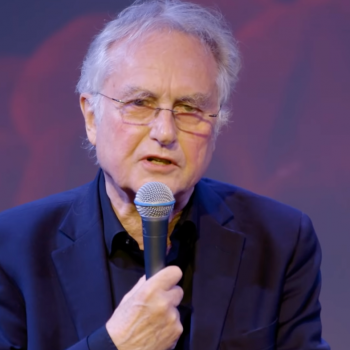This is a guest post written by Phil Zuckerman. Zuckerman is a professor of sociology and secular studies at Pitzer College. His most recent book is What It Means to Be Moral: Why Religion Is Not Necessary for Living an Ethical Life.
…

A few years ago, writer Hank Pellisier, of Northern California, was following some heated banter on Reddit. Atheists and god-believers were arguing, as is their wont. During the contentious back and forth, a Christian began mocking his secular adversaries on the topic of charity, pointing out that people of faith are known for their giving, while atheists are not. Although some analyses out there indicate that this assumption isn’t as robust as people assume, most studies do show that when it comes to charitable giving, the religious beat out the non-religious. For example, according to the Philanthropy Panel Study of the University of Indiana’s Lilly Family School of Philanthropy, while 62% of religious households give to charity, only 46% of nonreligious households do.
At one point in the on-line argument, the Christian wrote something along the lines of: “what good have atheists ever done? nothing at all… Have you ever heard of an ‘atheist orphanage’?!?!?! hahaha LOL, No, you haven’t.”
That got Hank Pellisier thinking. And then he set to working: In 2014, he connected with African journalist and humanist Bwambale Robert Musubaho, and created a nonprofit organization that led to the building of the world’s first atheist orphanage in Muhokya, Uganda. With the subsequent success of more fundraising, he soon built an entire school for the orphans, BiZoHa Humanist Primary School.
Since then, Hank’s secular non-profit, Humanist Global Charity, has raised hundreds of thousands of dollars, helping people all over the world in need. (Full disclosure: I currently serve as Executive Director.)
Humanist Global Charity, however, is but one of a growing group of atheist and humanist charities that have emerged in recent years, including:
- Foundation Beyond Belief, which “seeks to end poverty and hunger, promote good health and well-being, and foster employment opportunities and economic growth in ways that exemplify humanist values.”
- Non-belief Relief, a “humanitarian agency for atheists, agnostics, freethinkers and their supporters to improve this world, our only world.” Nonbelief Relief seeks to improve the human condition, not “save souls.” In the words of Nonbelief Relief Vice President Dan Barker, “Charity is not true charity that comes with evangelical strings attached.”
- Atheist Alliance Helping the Homeless, which does just that.
- First in the Family Humanist Scholarships, which provides college funding for students of color, LGBTQI, unhoused, disabled, undocumented youth, and those in foster care.
- Secular Rescue, housed within the Center for Inquiry, provides emergency assistance to writers, bloggers, journalists, publishers, and activists who face threats of violence due to their being non-religious, and helping them escape to safety.
- Free Hearts, Free Minds, which provides various forms of assistance and mental health services to people from Muslim-majority nations who face various challenges as a result of their having left the religion of Islam.
To be sure, there are many larger charity organizations out there that are secular by default, meaning that they do their good works without any specific religious affiliation or motivation. Such charities include Doctors Without Borders, Children International, the American Kidney Fund, National Women’s Law Center, the Robin Hood Foundation, Greenpeace, and so many others. But unlike these de facto secular charities, the organizations listed above are explicitly secular and self-consciously humanist, meaning that they draw their leadership and support from actively secular communities, while working hard to publicly put secular humanist values and ideals into practice by alleviating suffering for its own sake, and advancing justice and well-being as ends in and of themselves, without any supernatural assumptions or ultimate religious motivations.
While rational legal, political, and institutional mechanisms are clearly the most effective ways to fight hunger, homelessness, illiteracy, inequality, and disease — as highly secular democracies such as Scandinavia, New Zealand, Uruguay, and Japan illustrate — in a world still sadly wracked by much need and despair, charities definitely have their work cut out. Many such charities have been religious, but today, more and more are secular. And as increasing numbers of people walk away from religion, we can expect these humanist charitable endeavors to increase — spreading godless goodness in even greater degrees.
Hopefully, we can give the religious a run for their money, literally.
(Image via Humanist Global Charity)




It’s Moving Day for the Friendly ..."
It’s Moving Day for the Friendly ..."
It’s Moving Day for the Friendly ..."
It’s Moving Day for the Friendly ..."